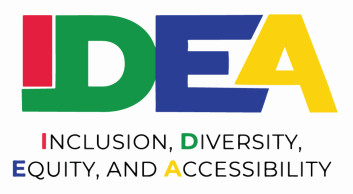Goal
To increase the diversity of the UMGCCC research workforce and build a more inclusive, equitable, and accessible community that addresses cancer disparities and advances health.

Strategic Aims
In collaboration with UMGCCC programs, COE, CRTEC, Shared Resources, UMSOM, UMB, and partner institutions, the IDEA Office will:

Aim 1
Increase the diversity of UMGCCC research workforce by supporting targeted recruitment and implementation of mentorship programs for URM faculty and trainees.

Aim 2
Ensure a more equitable, inclusive, and accessible work environment at UMGCCC that promotes the highest quality of education, training, and research for all.

Aim 3
Support IDEA culture at UMGCCC through implementation of focused training and communication activities

Aim 4
Develop and implement criteria for monitoring and evaluation of the progress of UMGCCC's IDEA programs.
Justification for Inclusion, Diversity, Equity and Accessibility Initiatives
Ample evidence from business and scientific settings shows that diversity of thought leads to greater creativity and innovation
Equitable representation of researchers from diverse backgrounds and perspectives in the scientific workforce is critical to facilitating better health outcomes for the entire U.S. population.
NIH data show a lack of representation of individuals from underrepresented groups among NIH applicants and funded principal investigators (PIs). For example, research grants NIH awarded to institutions in 2020 supported 72.9% White PIs compared with 22.6% Asian PIs, 2.7% Black PIs, and 0.3% American Indian or Alaskan Native PIs.
NCI’s P30 Plan to Enhance Diversity (PAR-21-321)
NIH and NCI are committed to ensuring that all Americans share equally in the medical advances that result from cancer research, and that current disparities in the burden of cancer are reduced or eliminated. Diversity creates stronger cancer science and is a critical step in reducing the burden of cancer for an increasingly diverse America. NCI is directing all cancer centers to:
- Enhance participation of women, minorities, and individuals from groups nationally under-represented in the research workforce, center leadership, and advisory boards
- Use special opportunities, if available, within the center’s catchment area to enhance the diversity of the research workforce and center leadership of CCSG-supported components (Senior Leadership, Research Programs, Shared Resources, Community Outreach and Engagement, etc.)
- Support career-enhancing research opportunities for junior, early- and mid-career researchers, including those from diverse backgrounds, to prepare them for center leadership
- Establish infrastructure and utilize institutional resources to expand the pipeline of members of diverse backgrounds through training or mentoring opportunities to encourage participation of students, postdoctoral researchers and co-investigators from diverse backgrounds, including those groups shown to be nationally underrepresented in research workforce
- Leverage institutional commitment and infrastructure to enhance diversity of the center’s membership and leadership
- Establish criteria for monitoring and evaluating progress of diversity
Notice of NIH’s Interest in Diversity (NOT-OD-20-031)
The IDEA Office is committed to enhancing the diversity of UMGCCC’s research workforce.
The NIH defines the following populations as those underrepresented in the U.S. Biomedical, Clinical, Behavioral and Social Sciences Research Enterprise:
- Blacks or African Americans, Hispanics or Latinos, American Indians or Alaska Natives, Native Hawaiians and other Pacific Islanders
- Individuals with disabilities
- Individuals from disadvantaged backgrounds (see NOT-OD-20-031 for complete definition)
- Women, especially from any of the above backgrounds

News & Announcements
IDEA news and announcements will be posted here
- Lorem ipsum dolor sit amet, consectetur adipiscing elit.
- Donec volutpat eros vitae ultrices vestibulum.
- Nunc nec neque in purus iaculis vestibulum.